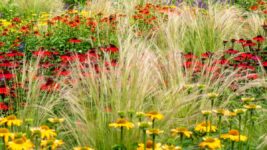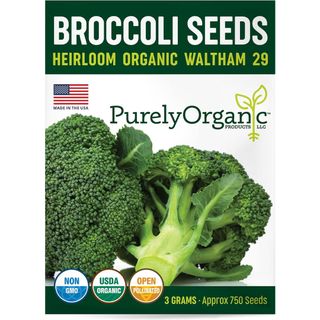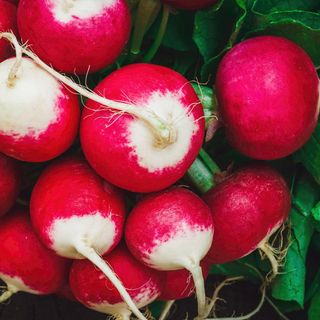The arrival of cool, crisp weather means it’s time to bring a fall touch to your garden. Summer will be missed, but see this as a way of extending the season so you can continue to enjoy your outdoor space (and bring a bit of that greenery indoors). Fall is a good time, too, for taking stock of what did and didn’t work in your garden this year, and getting a plan in place for the year ahead.
Fall gardening is all about replacing faded summer flowers, renovating borders, and replanting containers. In other words, now is the time for planting. It could be finally getting around to choosing that tree you’ve been thinking about, or sowing a selection of spring-flowering bulbs or vegetable varieties that will relish the cooler weather.
Fall is not a season of shut-down in the garden. Instead, head outside with this handy guide to the best fall gardening ideas we could find and expert suggestions on how to bring them to life in your yard.
1. Plant a Small Tree Like the Japanese Maple
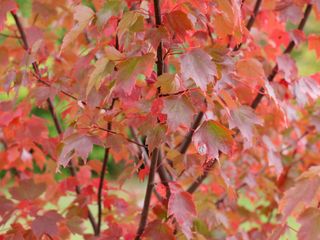
(Image credit: Deborah Vernon/Alamy Stock Photo)
Japanese maple is a great pick for a small garden tree because of its stunning fall foliage. “The leaves transform into vibrant shades of red, orange, and yellow in the fall, providing a beautiful display,” says Alex Betz, landscape designer at Plant by Number. “This tree can be a focal point in your garden throughout the year. The Japanese maple’s elegant branching and slow growth bring a touch of sophistication to any landscape.”
Try the brandywine maple, which is one of the best maple trees for fall color. Its upright, symmetrical growth habit and tolerance to urban environments make it a favored choice for landscaping.
When is the best time to plant trees? To ensure growth in the spring and summer, it’s best to plant your Japanese maple in late autumn. Water in the tree to help it become established and continue watering regularly, especially in dry weather.
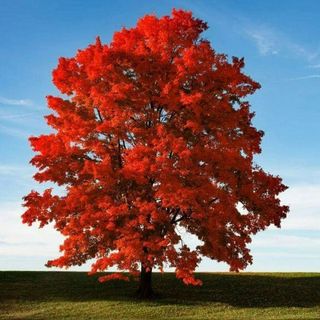
Brandywine Red Maple Tree
Price: $32.16
Growth Height: 12-25″ Tall
Bright and full of life, this Brandywine Red Maple Tree from Walmart comes in a quart pot and can reach up to the mature height of 25 feet fall. Ensure it’s planted in partial shade to full sun.
2. Choose Something Different for a Fall Container
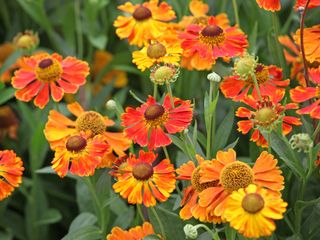
Orange and yellow helenium flowers are a great choice for fall containers
(Image credit: Alex Manders/Getty Images)
Include some new planting combinations as part of your container gardening refresh. The warm tones of helenium with the elegant plumes of purple fountain grass are a striking seasonal combination and will add height and texture to your fall container scape.
“Helenium brings warm, autumnal tones to your garden with its rich, daisy-like flowers in shades of orange, red, and yellow,” says Alex Betz. “The ornamental grass adds a graceful, airy texture with arching, burgundy-tinted plumes. The deep purple tones of the grass complement the warm hues of helenium, creating a balanced and dynamic container arrangement.”
Alex also suggests pairing vibrant chrysanthemums with bold ornamental peppers for a seasonal display full of color and texture, creating an eye-catching fall container. “Chrysanthemums are a classic choice for fall containers. They come in vibrant colors like orange, yellow, and deep red, making them perfect for seasonal displays.”
Their dense, bushy form adds volume, and their late bloom time ensures color well into the season. Ornamental peppers add a bold splash of color with their bright, glossy fruits. “These peppers, in shades of red, orange, yellow, and even purple, contrast beautifully with the softer tones of chrysanthemums, bringing energy and warmth to your fall container.”
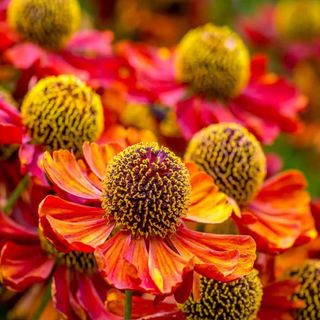
Outsidepride Helenium Autumnale
Price: $9.99
This long-lived perennial native to the US is a beautiful touch to any backyard. It’s a profuse bloom and attracts beneficial garden insects such as bees that love to feast on its nectar.
3. Incorporate Heuchera into Your Fall Garden Planting
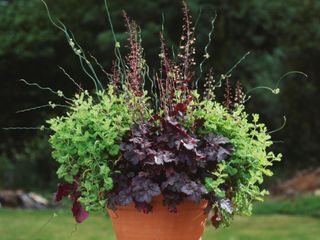
Heuchera ‘Can-can’, corkscrew rush (Juncus effusus f spiralis) and wood sage (Teucrium scorodo)
(Image credit: Dorling Kindersley Ltd/Alamy Stock Photo)
Heuchera is a go-to perennial if you’re looking for stunning foliage in shades of burgundy, bronze, and green. “It’s perfect for adding color and texture to fall garden beds or containers,” says Alex Betz. “Heuchera is also low-maintenance and thrives in partial shade. With its long-lasting foliage, it will provide visual interest into the winter months.”
Also known as Coral Bells, heuchera like partial shade and are a good choice as a filler plant for containers, and filling gaps between taller plants, providing color virtually all year round. They are easy to grow, versatile, and low maintenance.
Pair heuchera with contrasting plants like ornamental grasses or evergreens to create a dynamic and layered garden design.
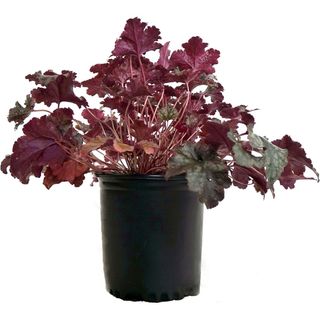
Heuchera ‘Plum Pudding’ (Coral Bells)
Price: $17.99
This Plum Pudding Heuchera from Amazon will grace your garden with its purple and silvery foliage that is truly breathtaking. Remember, this plant loves to be placed in well-draining soil and can grow up to a mature height of 10-12 inches tall.
4. Pick Out Some Unusual Bulbs for Spring
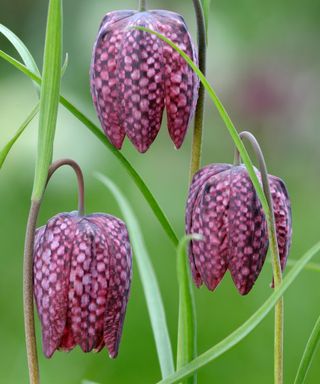
(Image credit: Buiten Beeld/Alamy Stock Photo)
There are a few spring bulbs to plant in the fall. The air is getting crisper in the morning, which is an ideal time to sow a selection of daffodil, tulip, and hyacinth bulbs for next spring. But as you flip through the bulb catalog, it could also be a good time to add something different to the mix, along with those old favorites.
There’s a world of gorgeous bulb choices that might be less familiar and just as spectacular when in bloom.
“Snake’s head fritillary (or checkered lily, as it’s also known) has the most unusual reddish purple and white checkered pattern on their bell-shaped blooms,” says horticulturist Peggy Anne Montgomery. “They will literally stop people in their tracks. They prefer medium moist, well-drained soil in sun to part shade. They are excellent for naturalizing or can even be planted in perennial borders, as they will go dormant in summer when the perennials are up.”
Other unusual bulbs to plant in autumn are camassia, allium nigrum, and wand flowers.
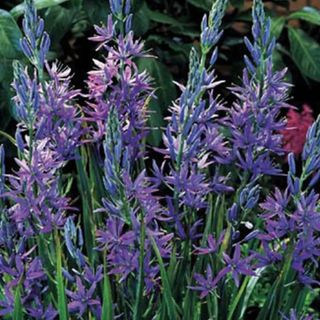
Price: $13.95
This Camassia, Blue Heaven plant from Burpee comes with 3 bulbs and is the ideal plant for naturalizing meadows. It can also tolerate heavy clay soils and damp/wet areas.
5. Get your Lawn into Shape Before Winter
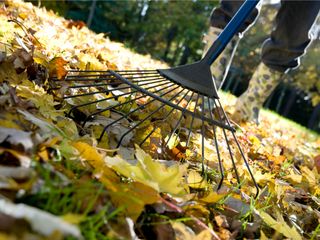
(Image credit: David Burton/Getty Images)
Some essential yard work is necessary as part of your fall gardening to set up your lawn for winter and beyond. Always be sure to rake leaves regularly so they don’t smother the grass. This is especially important if you have trees with large leaves such as maples.
“Continue to mow the lawn until the grass stops growing,” says Gary McCoy, store manager at home improvement specialists Lowe’s. “Not only will it make your lawn look more attractive, but it will make raking easier, too. Fall is also a great time to aerate the turf because you won’t be walking on the soil plugs that are removed during the aeration process.”
Fall’s cooler temperatures and more abundant moisture make it easy to reseed any troublesome bare spots in the lawn, too. “Scratch the surface to loosen soil, sprinkle grass seed and cover lightly with straw or other mulch to prevent birds browsing for food,” says Gary. “Keep the seed well-watered until the grass is established.”
Fertilizing in fall is another lawn care essential and also a good idea as it can help strengthen the turf for winter. Looking for the best lawn fertilizer? This Miracle-Gro Shake ‘N Feed All Purpose Continuous Release Plant Food, from Target has been rated 5/5 stars and is only $15.59.
6. Bring Houseplants Back Indoors
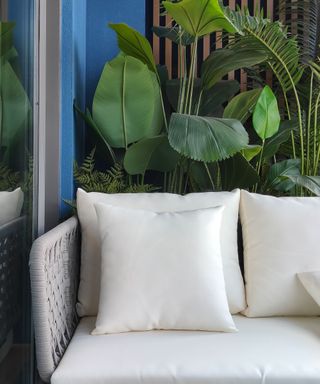
(Image credit: Xizeng Lu/Getty Images)
If your small indoor plants have been holidaying outside all summer don’t wait until the last minute to bring them indoors for the winter. The later you do it, the more harmful it can be to your plants as the light source and humidity sift. It is best to begin acclimating plants slowly.
“One of the best ways to prepare a plant for the winter is to move it from its usual spot to somewhere still outdoors but slightly shadier, like a porch or under a patio umbrella,” says Angalena Malavenda, operations and marketing lead at Palmstreet. “A week or two should be sufficient before moving them indoors.”
Before bringing your plants in, make sure any unwanted guests have been properly removed, adds Angalena, “whether that’s with a shower, a natural and harmless pesticide, or whatever options you have found best for your specific plant.”
7. Familiarize Yourself with Fall Flowering Bulbs
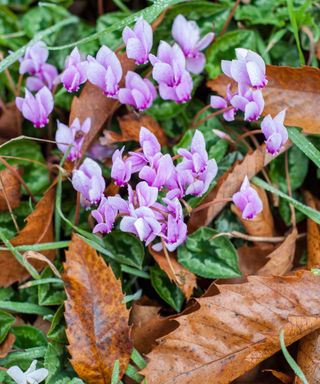
Autumn flowering cyclamen
(Image credit: Gary K Smith/Alamy Stock Photo)
“Not everyone knows that there are also bulbs that flower in autumn,” says internationally acclaimed garden designer and bulb expert Jacqueline van der Kloet. “This is probably because you have to order them in the middle of summer, from the end of July, and plant them as soon as they arrive.”
If you’re anything like us, you’re likely spending mid-summer focusing on how to get more roses or when your dahlias are likely to start flowering. But switch to the idea of planting fall flowering bulbs then, and it’s fantastic to suddenly see something new and colorful appear in an increasingly subdued autumn garden.
The most well-known and readily available species are colchicum (similar in appearance to crocus but with larger flower), autumn crocus, autumn flowering cyclamen, and sternbergia — which are deep yellow, goblet-shaped flowers, also known as winter daffodils. Here’s your reminder to put a note in your 2025 calendar now.
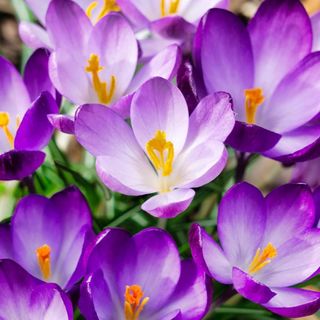
Autumn Crocus Seeds Colchicum Autumnale
Price: $9.96
Pretty in purple, these Autumn Crocus Seeds from Amazon are truly a precious sight. Ideal for blooming in the fall, this flower loves to be planted in well-draining soil and placed in a sunny to partial shade location.
8. Plant Cool-Season Vegetables
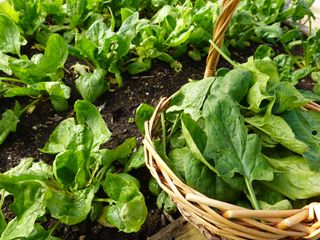
(Image credit: Toni Jardon/Getty Images)
One of our favorite fall gardening ideas is making the most of the range of edibles you can continue to grow despite summer waning. Fall is a rewarding time to plant cool-season vegetables, which thrive in the crisp weather, and develop enhanced flavors and textures as a result.
“From the sweetened leaves of spinach and the robust heads of broccoli to the colorful crunch of carrots and radishes, fall gardens offer a variety of crops that mature beautifully in cooler temperatures,” says Carrie Spoonemore, co-creator of Park Seed’s from Seed to Spoon app. “Planting these vegetables not only ensures a bountiful harvest but also brings the added benefit of gardening with fewer pests and maintenance challenges.”
Spinach thrives in cooler temperatures, making it perfect for fall planting. “It can even survive light frosts, which can improve its sweetness,” says Carrie. “Spinach’s fast growth rate means you can plant it well into the fall and enjoy multiple harvests.”
Broccoli also grows well in fall gardens. “Fall-planted broccoli is less prone to pests like aphids, which are less active in cooler temperatures,’ explains Carrie. “Broccoli doesn’t tolerate heat well, so the cool weather helps keep broccoli heads compact and tender.”
Radishes grow quickly in cool weather, with many varieties maturing in just a few weeks. “They are ideal for succession planting in the fall, allowing you to harvest and replant several times throughout the season. Fall radishes are often milder in flavor and have a crisp texture, enhanced by the cool growing conditions.”
Always check out the best planting dates based on your actual location to find out what to do with your vegetable beds this month.
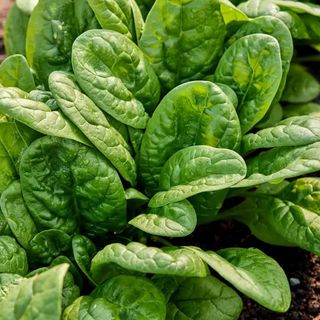
Spinach, Bloomsdale Long Standing
Price: $5.95
These organic seeds from Burpee can be purchased in a pack of 1,100 seeds.
We hope you’ve been inspired to grow, plant and sow some of these treasures for the fall.
Fall gardening is a rewarding experience and will give you all you need to prepare for a blooming garden over the next few months.
Happy planting and good luck!
